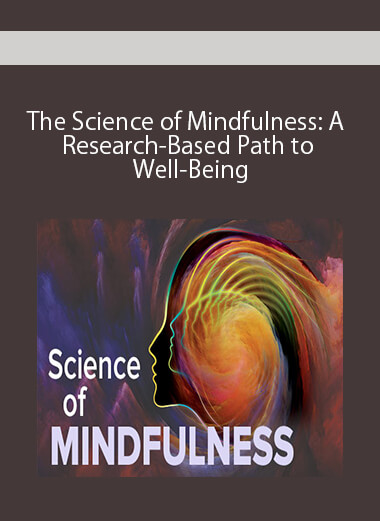The Science of Mindfulness: A Research-Based Path to Well-Being
The Science of Mindfulness: A Research-Based Path to Well-Being
The Science of Mindfulness: A Research-Based Path to Well-Being
Product Delivery: You will receive a download link via your order email
Should you have any question, do not hesitate to contact us: support@nextskillup.com
Original price was: $234.00.$44.00Current price is: $44.00.
81% Off


Secure Payments
Pay with the worlds payment methods.

Discount Available
Covers payment and purchase gifts.

100% Money-Back Guarantee

Need Help?
(484) 414-5835
Share Our Wines With Your Friends & Family
Description
 The Science of Mindfulness: A Research-Based Path to Well-Being
The Science of Mindfulness: A Research-Based Path to Well-Being
The human brain has an innate tendency to seek pleasure and to anticipate and avoid pain. Many of the psychological and behavioral problems we face today are traced to the mental hardwiring of our earliest ancestors, according to modern science.
For thousands of years, people have used practices to deal with a wide range of life challenges. There is a large and fascinating body of scientific research that supports the benefits ofMindfulness practice for psychological as well as physical health.
But how does it work in terms of science? Understanding the science and practice of meditation can improve your life. How can the human brain, whose very functioning gives rise to so many of the problems we struggle with, actually provide a solution?
Professor Ronald D. Siegel, a clinical psychologist on the faculty of Harvard Medical School, is the author of The Science ofMindfulness. You will have a clear idea of the science underlying ancient practices that are now profoundly influencing the contemporary world by studying the neurobiology involved. You will learn how to use the techniques in your own life.
An empirical science.
There is an explosion of scientific research demonstrating that the function and structure of the brain can be changed by practicingMindfulness practice. Many studies show which parts of the brain are affected by meditation and how it benefits our minds and bodies.
You will learn about the science behindMindfulness topics.
- Neurobiology and well-being: Learn how, when we’re worried or scanning the environment for trouble, our brain activity tends to center on the amygdala and the right prefrontal cortex, whereas left prefrontal cortical activity correlates with happiness, engagement, and contentment. Examine research demonstrating that sustained mindfulness practice activates this left prefrontal region.
- Changing brain function and structure: Take a broad look at what neuroimaging technologies tell us about how mindfulness affects brain function by activating specific areas of the brain that regulate emotions, integrate feeling states and thought processes, deepen empathy and equanimity, and reduce cognitive decline as we age.
- The science of self-preoccupation: Learn about the human brain’s “default mode network,” a neural system that’s activated during stressful thinking about ourselves, centered in the posterior cingulate cortex (PCC). Grasp how mindfulness techniques dramatically affect the PCC, quieting this hub of self-referential thinking.
There are a lot of applications.
The scientific findings have led to the adoption ofMindfulness practices into mainstream psychotherapy and many other healthcare settings. You will learn howMindfulness practices are used to treat a wide variety of psychological and behavioral difficulties that can interfere with leading a rich and fulfilling life.
- Depression: Grasp how mindful awareness impacts depression by changing our relationship to moods, feelings, and thoughts, allowing us to perceive them as transient and ultimately impersonal events.
- Compulsive and addictive behaviors: Learn how mindfulness techniques can dismantle troublesome habits and behaviors by enabling us to “surf” waves of feelings and urges without having to act on them.
- Chronic pain: Discover the success of mindfulness practices in treating pain, by changing our relationship to moment-to-moment sensations and our thoughts about them.
- Stress and other psychological symptoms: Explore the extraordinary results of mindfulness techniques in groundbreaking stress-reduction programs, cognitive therapy, dialectical behavior therapy, and other acceptance-based treatments.
A good guide for practice.
The benefits of practicing it are similar to the benefits of physical fitness. Professor Siegel encourages and helps you to practice both with him and on your own. Several of these techniques are also provided for enhanced practice on supplementary audio tracks with the course.
- Breath Awareness Practice a foundational formal meditation practice and one of the simplest ways to calm and integrate the mind and body
- Loving-Kindness Practice a fundamental practice for cultivating acceptance, both toward the contents of your own mind and toward others;
- Mountain Meditation a core equanimity practice, valuable for riding out storms of emotion more effectively;
- Breathing Together a powerful practice for developing interpersonal connection;
- 3-Minute Breathing Space a practice useful in moments of acute distress;
- R-A-I-N a practice empowering you to be with and investigate challenging emotional or physical states; and
- Befriending the Changes a meditation on the impermanence of the body, useful for working with the challenges of illness and aging
Professor Siegel makes it clear in the lectures that the practice of meditation trains us to bring deep awareness to the present moment and become more fully conscious of our unfolding sensory and mental experience. As it arises. . Research shows that this awareness can profoundly change our relationship to our experience. Professor Siegel is an ideal guide as he has more than three decades of success teaching and exploring their scientific underpinning with students, clients, and mental health professionals.
Uncommon Thoroughness and Depth are taught.
Professor Siegel’s knowledge of both ancient and modern Buddhist psychology and Western cognitive science allows him to show how modern practices can allow you to perceive the fluid nature of the self and the reality of your own profound interconnectedness with the world.
This playful, caring, and brilliantly designed course places in full view the impact and relevance ofMindfulness techniques in responding effectively to many of humanity’s most fundamental psychological and existential problems. The Science ofMindfulness shows you how these techniques can transform the mind, the heart, and the experience of everyday life, joining ancient wisdom practices and scientific methodology in forging new possibilities for living.
Get. There is a research-based path to well-being. Right now!
Delivery Method
– After your purchase, you’ll see a View your orders link which goes to the Downloads page. Here, you can download all the files associated with your order.
– Downloads are available once your payment is confirmed, we’ll also send you a download notification email separate from any transaction notification emails you receive from nextskillup.com .
– Since it is a digital copy, our suggestion is to download and save it to your hard drive. In case the link is broken for any reason, please contact us and we will resend the new download link.
– If you cannot find the download link, please don’t worry about that. We will update and notify you as soon as possible at 8:00 AM – 8:00 PM (UTC 8).
Thank You For Shopping With Us!
OUR BEST COLLECTION OF COURSES AND BOOKS





Reviews
There are no reviews yet.